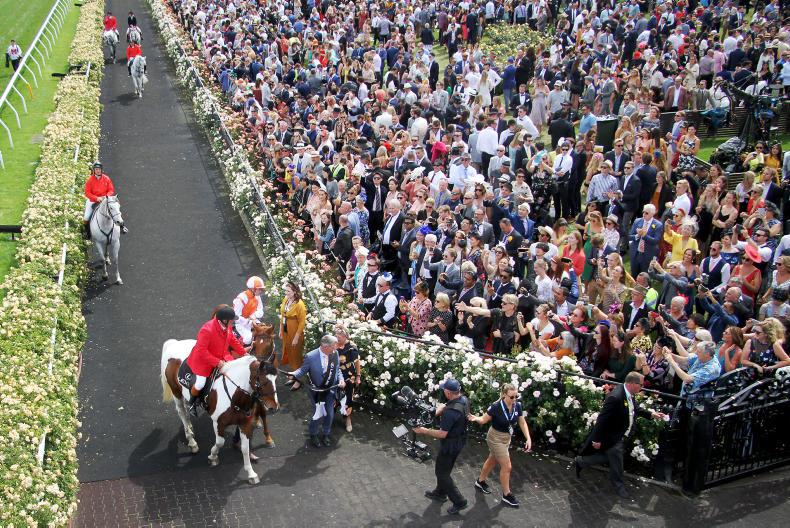THE last week has brought with it two of the great spectacles in international racing, with the Breeders’ Cup taking centre stage last weekend before the focus shifted to Australia for Tuesday’s Melbourne Cup. Both events represent the pinnacle of the sport and delivered more than their share of excitement and drama.
From an Irish perspective, Iridessa’s victory in the Filly & Mare Turf last Saturday was the highlight of the action from America before Vow And Declare struck a notable blow for the local racing and breeding industry at Flemington on Tuesday.
However, both events took place against a backdrop which offers telling lessons for racing in this part of the world.
In terms of Santa Anita, the Breeders’ Cup was staged towards the end of a fraught year for the California track which had to be temporarily shut down in the spring owing to a spate of equine fatalities. Meanwhile, the Melbourne Cup was run just a couple of weeks after an investigative programme on Australian television looking into horse racing provoked quite a backlash after raising allegations of animal cruelty involving former racehorses.
In the aftermath of the Melbourne Cup and with reference to that investigate programme, one of Vow And Declare’s part owners, Geoff Corrigan, said: “There’s a social contract with racing. That social contract has been fractured a little in the last two weeks.”
Maybe it’s coincidence but more than likely as a result of that channel ABC report the attendance for the Melbourne Cup hit a 24-year low, albeit still coming in at a figure of 81,408. Invariably when such events occur it is the bad news which garners headlines and seeps into the public consciousness.
The fact that Racing New South Wales was spending Aus$2.5 million a year rehoming racehorses became a mere footnote relative to the fallout from the ABC programme.
When reputational damage occurs it is extremely hard to claw back lost ground or goodwill. In terms of Santa Anita, remedial work took place before its fall meet got under way and the fatality rate since then is nothing like what is was in the spring, yet instead the focus rests with comments made by the governor of California, Gavin Newsom, to the New York Times in late September.
“I’ll tell you, talk about a sport whose time is up unless they reform. That’s horse racing,” said Newsom.
Things can change
The purpose of all this is to show just how quickly things can change. Whatever about America, the Australian racing model has long been held in the highest regard whether it be in terms of prize money, the levels of interest and attendance, and the diverse nature of its ownership base.
Yet racing there now finds itself under siege from public opinion.
There are lessons to be learned from what has taken place in America and Australia. Countries and cultures vary but it would be a mistake to assume that racing’s position in Ireland puts it on a more secure footing than in other jurisdictions.
Society is changing and has changed dramatically and the opinion of many, whether they have an interest in racing or not, should not be taken lightly.
Nowadays, a sport that has animals as its central participants can expect to be subjected to a high level of scrutiny and standards and it simply cannot afford any missteps.
Just consider what befell the greyhound industry earlier this year following a programme that aired on RTÉ. Amid the consternation, the greyhound industry announced reforms regarding rehoming and retirement.
However, it was too late to have desired effect. High profile sponsors left that sport and the message regarding rehoming and retirement, which was a positive one, was drowned out.
Unfortunately, grim and negative headlines will generally achieve a greater level of traction than positive ones, something that horse racing needs to bear in mind.
The events that have unfolded in California and Australia this year offer compelling evidence that racing jurisdictions in this part of the world need to be extremely mindful and vigilant on welfare issues. As we have seen elsewhere in the world, and at home with regard to the greyhound industry, the battle is already lost when you are starting on the backfoot and efforts and initiatives to maintain a sport’s social contract should not be reactive but work far better in a proactive format.
THERE was a curious anomaly to consider from a meeting at Thurles late last month.
In the mares’ handicap hurdle at that fixture, Robin Gold justified strong support throughout the day to land quite gamble.
As it was by far the winner’s best effort on the track, there was improvement in form enquiry which was referred on to the IHRB.
On that same afternoon another gamble was landed when Arizengo picked up the 80-95 rated handicap hurdle. The winner had been well-beaten on his three previous starts yet the activity from the stewards’ room concerning this race was an enquiry into the fall of Bannow Breeze after the fourth last flight, while it was also noted that the beaten favourite, Fight For Love, was blowing hard post race.
Surely if Robin Gold warranted an improvement in form enquiry there were grounds for having one after Arizengo’s victory.
